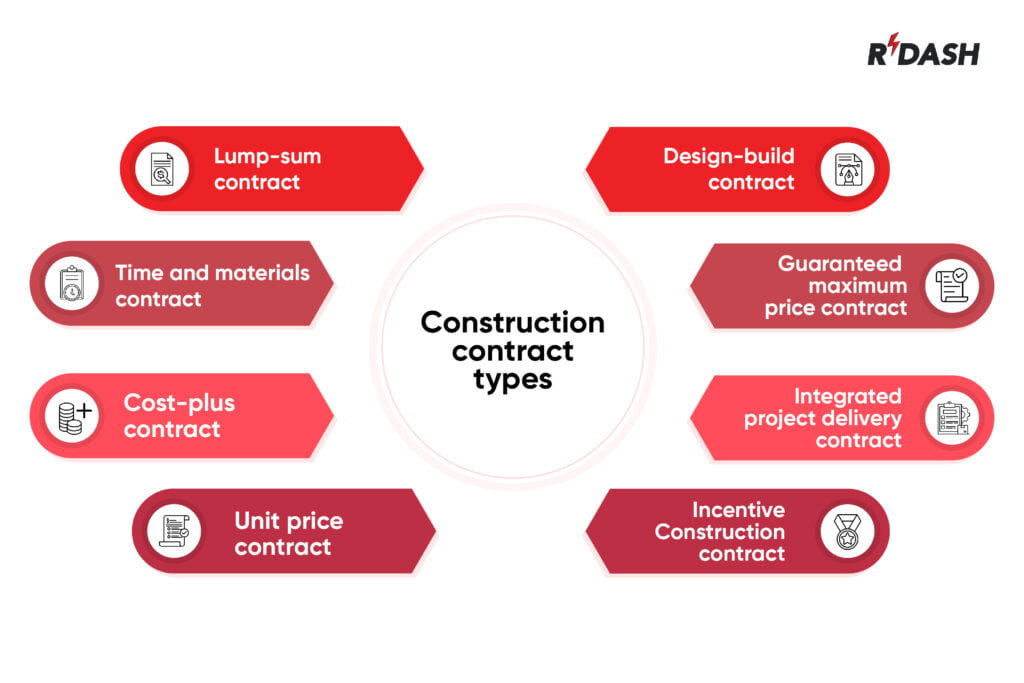What Is a Construction Contract?
A construction contract is a formal agreement that legally binds two or more parties engaged in a construction project. This agreement outlines the responsibilities, roles, and rights of each party, detailing every aspect of the project from start to finish.
Key Components of a Construction Contract:
- Scope of Work: Describes the project details and work to be done.
- Project Timeline: Defines the start and completion dates of the project.
- Payment Conditions: Outlines how and when payments will be made.
- Resources and Services: Outlines the necessary materials and services required to complete the project.
- Legal Clauses: Includes warranties, dispute resolution methods, and termination conditions.

By setting clear terms and expectations, a construction contract ensures that every party knows exactly what is required of them, reducing the likelihood of disputes and confusion throughout the project.
Why is a construction contract necessary?
Construction contracts serve as a foundational tool in the building industry, offering crucial benefits that ensure smooth project execution. These contracts offer legal protection to everyone involved by clearly documenting the terms of the agreement. This is invaluable when disputes or legal challenges arise, providing a solid basis for resolution.
The contracts also bring clarity and transparency to the project, detailing the scope of work, budget, timelines, and other essential aspects. Such clarity helps manage expectations and fosters positive working relationships, ensuring that everyone is on the same page from the start.
Furthermore, these contracts address risk management by fairly distributing the significant financial and physical risks associated with construction. This equitable distribution ensures that no party is unfairly burdened, enhancing cooperation and stability throughout the project’s duration. Additionally, construction contracts are vital for payment security, particularly for contractors and suppliers. They outline specific payment schedules and conditions, protecting parties from delayed or missed payments, thus securing the financial aspects of the project. These features collectively make construction contracts indispensable in the building industry.
Benefits of having a construction contract
Construction contracts are essential in any building project, providing numerous benefits. They offer legal protection by safeguarding the rights of all parties and serving as a foundation for resolving disputes. These contracts also ensure clarity, as they define the roles and responsibilities of everyone involved, making the project’s requirements and expectations clear.
When it comes to risk management, construction contracts play a crucial role in identifying, allocating, and mitigating potential risks, thereby protecting the interests of all parties. Additionally, they ensure payment security, guaranteeing that payments are made correctly and on time, which helps maintain financial stability and trust between parties. This structure not only promotes a smooth workflow but also helps prevent conflicts and legal issues.
Types of construction contract
Selecting the appropriate construction contract is key for any project, as each type is designed to meet specific project needs and requirements. Let’s break down the most common types of construction contracts in an easy-to-understand way:

Lump sum contract
This type of contract is clear-cut: you agree to a predetermined price for the entire scope of work. It’s a good choice when the project details are clear from the start and unlikely to change. The contractor has to manage within this budget unless you agree on changes later.
Time and materials contract
In this contract, payments are made based on the actual hours worked and the materials consumed. It’s flexible, making it a great option for projects where it’s hard to estimate the scope or how long things will take.
Cost plus contract
This type of contract, where the contractor is paid for all project costs plus a fee that covers profit, is particularly beneficial when project specifics might change. For a deeper understanding of cost-plus contracts and their applications, you can delve into this article on cost-plus contracts, which ensures that contractors are fairly compensated for all work done.
Unit price contract
This contract is usually preferred for larger projects that involve repetitive tasks, like building roads. Payments are made per unit completed, such as per cubic yard of concrete laid, making it easier to adjust if quantities change.
Design build contract
This method combines design and construction into one entity, simplifying the entire process. It helps streamline the process, as you deal with only one contract and one team from start to finish, potentially saving time and reducing conflicts.
Guaranteed maximum price Contract (GMP)
This contract sets a ceiling for how much the owner will pay, no matter what happens during construction. If costs exceed this maximum price, the contractor covers them. It’s a safeguard for the project budget, blending flexibility with financial control.
Integrated project delivery contract
This contract type brings everyone involved—owner, architect, contractor—onto the same team, sharing risks and rewards. The aim is to foster collaboration, drive innovation, and enhance efficiency throughout the duration of the construction project.
Incentive construction contracts
These contracts offer rewards for meeting or exceeding project goals, like finishing ahead of schedule or under budget. Conversely, there can be penalties for delays or cost overruns. The focus is on ensuring the contractor’s objectives match those of the owner.
| Contract Type | Pros | Cons |
|---|---|---|
| Lump-Sum | Predictable budget, simple accounting, efficiency incentive | Inflexible scope changes, contractor bears cost overruns |
| Time and Materials | Flexible scope, transparent billing | Unpredictable costs, requires diligent oversight |
| Cost-Plus | Adaptable to changes, promotes high-quality work | Potential for higher costs, less incentive to cut costs |
| Unit Price | Flexible payment based on work volume, simplifies billing | Cost varies with scope, complex if multiple units involved |
| Design-Build | Streamlined process, reduced conflicts, faster completion | Limited owner control, potentially higher costs |
| Guaranteed Maximum Price | Cost certainty, protects against overruns | May pay above market rate if under budget, complex to manage |
| Integrated Project Delivery | Enhanced collaboration, shared risks and rewards | Requires high trust, complex management |
| Incentive Construction | Motivates performance goals, shares savings | Risk of disputes over penalties, may compromise on quality |
Choosing the best construction contract for your project
Choosing the right construction contract is essential for the success of your project and hinges on several critical factors including the project’s scope, your budget constraints, the timeline, and how much risk you’re prepared to handle. If your project has a well-defined scope that isn’t expected to change, a fixed-price contract might be the best fit as it offers a predetermined cost. However, for projects where the scope could evolve, a cost-plus contract provides the necessary flexibility by allowing adjustments based on the actual expenses, which could be more appropriate.
Risk tolerance is another important consideration. With fixed-price contracts, the contractor assumes most of the risk for cost overruns, which might be more comforting to you as the owner. Conversely, cost-plus contracts shift more of this financial risk back to you since the final cost is dependent on the total expenses. For those with a project where both the timeline and budget can be adjusted, a time and materials or cost-plus contract could offer the adaptability needed to manage unexpected changes effectively.
By thoroughly evaluating these aspects, you can select a construction contract that aligns well with both your project requirements and risk preferences, ensuring smooth execution and management throughout your construction endeavour.
What should be included in a construction contract?
When creating a construction contract, it’s important to ensure that all necessary components are clearly defined to avoid any confusion and to protect all parties involved.
- Scope of Work: Clearly define what tasks the contractor is expected to perform.
- Construction Drawings: Include detailed drawings that outline the specific construction plans.
- Construction Specifications: Detail the quality and types of materials to be used.
- Contract Sum: Specify the total amount to be paid for the work performed.
- Payment Terms: Lay out how and when payments will be made, including any advance payments or milestones.
- Construction Timeline & Contract Duration: Establish key dates, including the project start date and expected completion date.
- Change Management: Detail the process for managing adjustments to the project’s scope or specifications.
- Responsibilities of Owner and Contractor: Clarify the roles and obligations of both the owner and the contractor.
- Warranty: Specify any guarantees provided by the contractor regarding the quality and durability of the work.
- Regulatory Compliance: Ensure the contract adheres to all relevant laws, codes, and regulations.
- Retainage: Detail any portion of the payment to be withheld until the project is completed satisfactorily.
Things to avoid when writing construction contracts
When drafting a construction contract, it’s crucial to avoid certain pitfalls to ensure the contract is both fair and enforceable. First, avoid vague terms. It’s crucial to clearly define the scope of work, payment terms, and other responsibilities to avoid any confusion that might result in disputes. Also, make sure the contract includes complete clauses for dispute resolution, termination conditions, and penalties for non-compliance, as incomplete clauses can leave significant legal gaps.
Furthermore, setting unrealistic timelines and budgets should be avoided. Setting expectations too high can result in conflicts, hurried tasks, and possibly reduced quality. Lastly, always ensure that the contract complies with local laws and regulations. Failure to do so can render the contract invalid, putting all parties at risk of legal challenges. By addressing these areas, you can draft a construction contract that is robust and reliable, protecting the interests of all involved.





